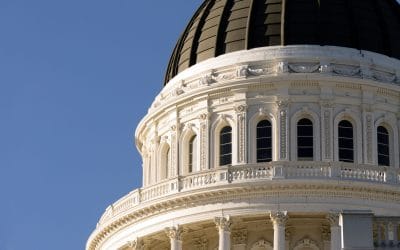An unprecedented roller coaster ride for general fund revenues and Proposition 98 funding
While the 2020 Budget Act included a steep decline in general fund (GF) revenue and a $10 billion reduction in the Prop. 98 guarantee, the 2021 Budget Act rebounded with the largest single year growth in GF revenue and the Prop. 98 guarantee ever recorded. Prop. 98 funding dropped to about $71 billion in the 2020 budget, but then soared up to nearly $94 billion in the 2021 budget. This additional state revenue, along with considerable federal funding, allowed the state to create and expand a number of programs and services. This increase in funding, however, did not fully mitigate all the challenges facing LEAs as the Delta-variant of COVID-19 continued to disrupt educational programs and other essential services for children.
We have provided numerous updates regarding the California budget and funding for PK-12 schools and programs, including at our Budget Perspectives Workshops, and provide only a concise summary of the highlights here.
The budget process and TK-12 funding
With the unprecedented volatility in state revenues and Prop. 98 funding, the budget process in 2021 was a little unusual. When it became clear in January that the state would have significant increases in revenue compared with prior budget projections, the Governor proposed a considerable appropriation outside of the usual budget process for schools to provide in-person instruction in the 2020-21 school year and for schools to provide additional learning time for students impacted by the pandemic. This eventually became a $6.6 billion mid-year appropriation to schools contained in AB 86, a bill approved by Governor Newsom in early March.
Major TK-12 components of 2021 Budget Act
Finalizing the 2021 Budget Act was complicated by distractions from the recall election and major changes to state policy related to COVID-19 and “reopening” California. As a consequence, the budget came together late and some actions and clean-up were not taken up until September. Following are the spending highlights from the budget:
- $11 billion to fully pay off the remaining K-12 apportionment deferrals
- $3.2 billion to fund a 5.07% “Super-COLA” for the LCFF
- A total of $4.5 billion shifted to the Prop. 98 reserve account for 2020-21 and 2021-22 – this money will be available if future increases in the Prop 98. guarantee are insufficient to cover
COLA - Plan to phase-in transition to universal Transitional Kindergarten by 2025-26, with cost reaching nearly $3 billion and a commitment to re-bench Prop. 98
- $1.75 billion to phase-in implementation of an Expanded Learning program for before and after school programs in TK-6 schools, with initial targeting of unduplicated pupils
- $1.1 billion to increase concentration grants to 65% of the base grant, with a requirement to use the additional funds to increase staff providing direct services at school sites
- More than $650 million for an ongoing increase in special education funding, primarily to raise the base rate from $625 to $715 per ADA, and significant one-time investments as well
- $3 billion of one-time funding to expand the California Community Schools Partnership Program
- $1.5 billion for a new Educator Effectiveness Block Grant available over five years, and an additional $1.3 billion for various teacher recruitment, retention and professional development
programs - Nearly $550 million for three grant programs to increase the number of students who graduate with A-G eligibility
- $150 million for an ongoing increase to the Career Technical Education Incentive Grant
- Plan to transition to a Universal School Meals Program, with an estimated cost of $650 million starting in 2022-23
- Major changes to claiming ADA through a new Independent Study law
The Governor signed the following school finances bills
Attendance
- AB 516 (Dahle, Megan) – Pupil attendance: excused absences: cultural ceremonies or events.
Current law, requires a pupil to be excused from school for specified types of absences. This bill adds to the list of required excused absences an absence that is for the purpose of participating in a cultural ceremony or event The bill defines “cultural” for these purposes to mean relating to the habits, practices, beliefs, and traditions of a certain group of people.
Chapter 281, Statutes of 2021
Budget and Trailer Bills
- AB 86 (Committee on Budget) – COVID-19 relief and school reopening, reporting, and public health requirements.
Among other things, AB 86 provided a total of $6.6. billion in one-time Proposition 98 General Fund for In-Person Instruction ($2 billion) and Expanded Opportunities Grants ($4.6 billion). Funding was proved in equal portions in May and August 2021 and are available for expenditure until August 31, 2022.
Chapter 10, Statutes of 2021 - AB 128 (Ting, Phil) – Budget Act of 2021.
This is the main 2021 Budget Act bill that contains most of the appropriations to fund government activity for 2021-22.
Chapter 21, Statutes of 2021 - SB 129 (Skinner, Nancy) – Budget Act of 2021.
Termed the Budget Bill Junior, SB 129 makes technical and substantive changes to AB 128, the Budget Act of 2021. The changes made include providing $215 million in federal American Rescue Plan Act funds for after school programs to increase daily rates for the After School Education and Safety Program to $10.18 in the 2021-22 and 2022-23 school years and reducing the state school meal reimbursement rate from $0.2544 to $0.2487 per meal.
Chapter 69, Statutes of 2021 - AB 130 (Committee on Budget) – Education finance: education omnibus budget trailer bill.
AB 130 is the K-12 education omnibus trailer bill that includes many K-12 appropriations and policy changes that go along with the Budget Act of 2021.
Chapter 44, Statutes of 2021 - AB 131 (Committee on Budget) – Child development programs.
AB 131 is the child development programs trail bill that includes the statutory changes necessary to enact the Child Care and Development statutory provisions of the Budget Act of 2021.
Chapter 116, Statutes of 2021 - AB 167 (Committee on Budget) – Education finance: education omnibus budget trailer bill.
AB 167 is the “clean-up” education trailer bill, which includes, among other things, additional clarity regarding the changes made to Independent Study in the 2021-22 Budget, language to allow funds received for the Expanded Learning Opportunities Program in 2021-22 to be spent in the 202-23 fiscal year as well, and clarifying language around grant eligibility for the California Prekindergarten Planning and Implementation Grant Program.
Chapter 252, Statutes of 2021
Local Control Funding Formula
- AB 1055 (Ramos) – Foster youth: tribal pupils and voluntarily placed children.
Current law defines a foster youth for purposes of supplemental and concentration grants pursuant to the local control funding formula (LCFF) to include a dependent child of the court of an Indian tribe, consortium of tribes, or tribal organization who is the subject of a petition filed in the tribal court pursuant to the tribal court’s jurisdiction in accordance with the tribe’s law, if the child would also meet specified state law standards describing when a child may be adjudged a dependent child of a juvenile court. AB 1055 deletes the requirement that a dependent tribal child also meet specified state law standards and adds children who are subjects of voluntary placement agreements to the definition.
Chapter 287, Statutes of 2021
School Finance
- AB 742 (Calderon) – Personal income taxes: voluntary contributions: School Supplies for Homeless Children Voluntary Tax Contribution Fund.
AB 742 extends the sunset date for the School Supplies for Homeless Children Fund from January 1, 2022 to January 1, 2029, unless a specified minimum contribution amount is not met, as well as makes changes to bring the fund into alignment with best practices for voluntary contributions funds, including renaming the fund the School Supplies for Homeless Children Voluntary Tax Contribution Fund.
Chapter 96, Statutes of 2021




0 Comments